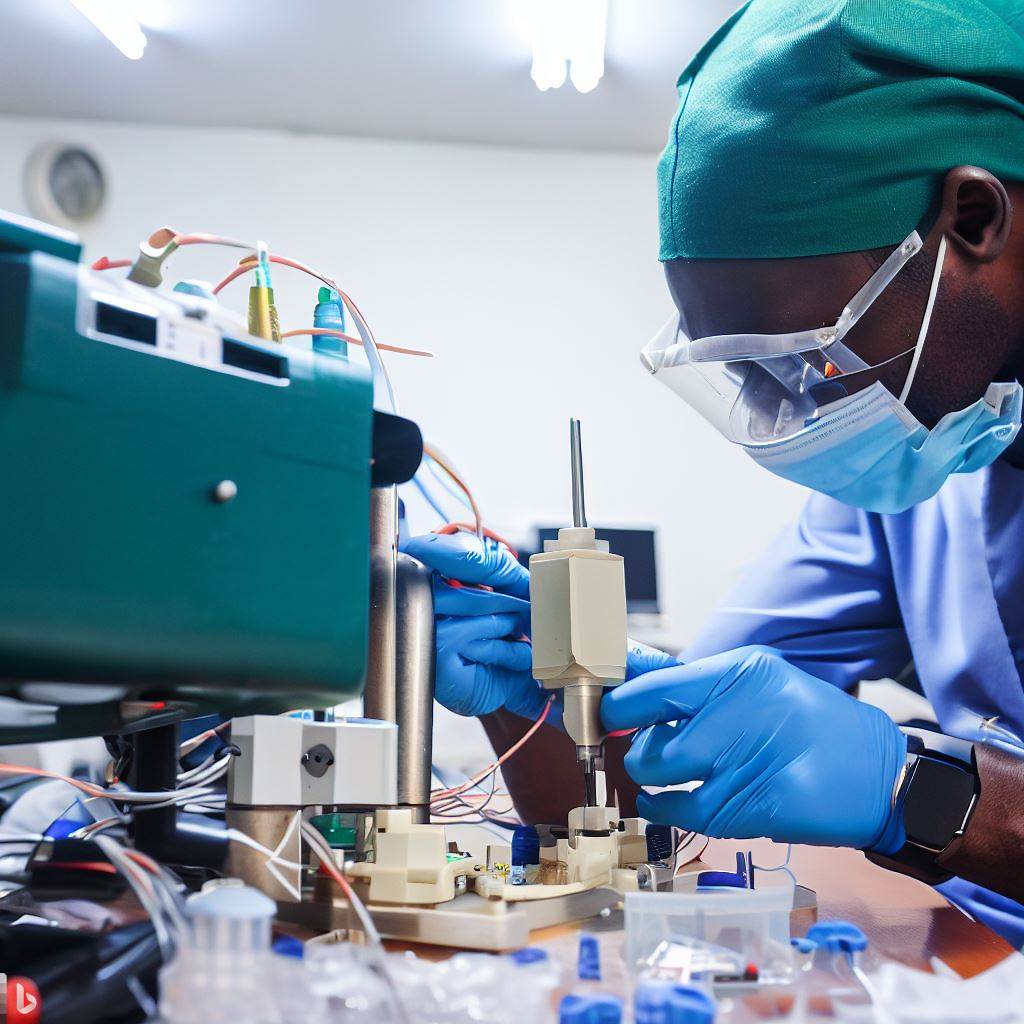Introduction
Biomedical engineering is the application of engineering principles to healthcare and medicine.
It plays a crucial role in improving healthcare outcomes and patient care.
In Nigeria, biomedical engineering is vital due to the challenges faced in the healthcare system.
A Definition of biomedical engineering
Biomedical engineering involves the design, development, and maintenance of medical equipment and technologies.
It focuses on creating innovative solutions to improve diagnosis, treatment, and rehabilitation.
B. Importance of biomedical engineering in healthcare
Biomedical engineering enhances medical practices and plays a vital role in patient safety.
It enables early detection and accurate diagnosis, leading to effective treatment and improved outcomes.
By developing medical devices and technologies, it improves the quality of life for patients.
C. Brief overview of the Nigerian healthcare system
Nigeria struggles with inadequate healthcare infrastructure and limited access to quality healthcare.
The country faces challenges such as a shortage of medical professionals and outdated medical equipment.
Biomedical engineers can address these issues by developing affordable and sustainable healthcare solutions.
In a nutshell, biomedical engineering is essential in Nigeria’s healthcare system.
It contributes to the diagnosis, treatment, and management of diseases, ultimately improving patient outcomes.
By leveraging engineering principles, biomedical engineers can revolutionize healthcare in Nigeria and beyond.
Overview of the Role of Biomedical Engineers
A. Responsibilities and Duties of Biomedical Engineers
- Designing and developing medical equipment.
- Maintenance and repair of medical devices.
- Collaborating with healthcare professionals.
Role of Biomedical Engineers in Nigeria’s healthcare sector is pivotal, merging engineering and medical expertise for superior patient care. They spearhead multifaceted tasks to innovate and uplift healthcare.
1. Designing and developing medical equipment
Primarily, they craft groundbreaking medical equipment, spanning diagnostics, monitoring, and treatment. Prosthetics, imaging, and surgical tools are part of their ingenious designs.
2. Maintenance and repair of medical devices
Furthermore, biomedical engineers uphold device functionality through meticulous maintenance and repairs. Routine checks, troubleshooting, and enhancements ensure optimal and secure operation.
3. Collaborating with healthcare professionals
Their collaboration with healthcare professionals amplifies their impact. Close teamwork with doctors and nurses refines equipment, aligning seamlessly with Nigerian healthcare practices.
They champion research, perpetually advancing healthcare technology. By updating and innovating medical gear, patient outcomes are elevated.
Ensuring quality and adherence to regulations is another facet. Rigorous testing and documentation, securing certifications, precede deployment in healthcare facilities.
Their educational contributions empower healthcare providers for adept equipment handling.
Through knowledge sharing, they fortify the healthcare system, fostering safe and efficient medical technology use.
In sum, Nigerian biomedical engineers undertake a pivotal role encompassing design, maintenance, collaboration, research, quality assurance, and education.
Through these endeavors, they significantly enhance patient care and propel healthcare technology forward.
Education and Training
A. Academic requirements for becoming a biomedical engineer in Nigeria
- Bachelor’s degree in biomedical engineering or related field.
- Postgraduate studies and specialization options.
In order to pursue a career in biomedical engineering in Nigeria, individuals must meet certain academic requirements.
These requirements form the foundation for building a successful career in this field.
1. Bachelor’s degree in biomedical engineering or related field
One of the key academic requirements for becoming a biomedical engineer in Nigeria is obtaining a bachelor’s degree.
A bachelor’s degree in biomedical engineering provides students with the necessary knowledge and skills to analyze and solve problems in healthcare technology.
The curriculum typically includes courses in anatomy, physiology, medical device design, and engineering principles.
2. Postgraduate studies and specialization options
While a bachelor’s degree is the minimum requirement, many biomedical engineers choose to pursue postgraduate studies.
This allows them to gain a deeper understanding of the field and specialize in a specific area of biomedical engineering.
Postgraduate programs may include Master’s or PhD degrees, and they typically involve research projects or internships that provide hands-on experience in the biomedical engineering industry.
Some common specializations in this field include imaging and instrumentation, biomaterials, and medical robotics.
B. Professional certifications and licenses
- Importance of acquiring relevant certifications.
- Nigerian regulatory bodies for biomedical engineering.
In addition to the academic requirements, acquiring professional certifications and licenses is crucial for biomedical engineers in Nigeria.
These certifications validate their skills and knowledge in the field.
1. Importance of acquiring relevant certifications
Professional certifications in biomedical engineering demonstrate a higher level of expertise and competency.
They provide credibility and enhance employability in a competitive job market.
Certifications also serve as a means of professional development, as they require ongoing education and training to maintain.
Some widely recognized certifications in the field of biomedical engineering include the Certified Biomedical Equipment Technician (CBET) and the Certified Clinical Engineer (CCE).
2. Nigerian regulatory bodies for biomedical engineering
Nigeria has regulatory bodies responsible for overseeing and regulating the practice of biomedical engineering in the country.
The main regulatory body is the Council for the Regulation of Engineering in Nigeria (COREN).
COREN ensures that biomedical engineers meet the necessary qualifications and adhere to professional standards.
It also licenses qualified engineers for practice in Nigeria.
Additionally, the National Agency for Food and Drug Administration and Control (NAFDAC) regulates medical devices and equipment to ensure their safety and effectiveness in healthcare settings.
By fulfilling the academic requirements and acquiring relevant certifications and licenses, biomedical engineers in Nigeria can establish themselves as competent professionals in the field.
These educational and professional qualifications provide a strong foundation for a successful career in improving healthcare technology and contributing to the overall well-being of the Nigerian population.
Biomedical Engineering in Nigerian Healthcare
A. Healthcare Challenges in Nigeria
- Limited access to medical equipment.
- Lack of skilled biomedical engineers.
Healthcare in Nigeria faces several challenges that hinder the delivery of quality services.
1. Limited access to medical equipment
One of these challenges is the limited access to medical equipment.
Many healthcare facilities in Nigeria lack the necessary equipment to effectively diagnose and treat patients.
This limited access to medical equipment severely impacts the quality of healthcare services provided.
2. Lack of skilled biomedical engineers
Furthermore, the lack of skilled biomedical engineers exacerbates the problem.
Biomedical engineers play a critical role in maintaining and repairing medical equipment.
However, Nigeria has a shortage of these professionals, which further limits access to functioning equipment.
Read: Women in Robotics Engineering: Profiles from Nigeria

B. Impact of Biomedical Engineering on Healthcare in Nigeria
- Improving healthcare infrastructure.
- Enhancing the quality of medical services.
Biomedical engineering has the potential to significantly improve healthcare in Nigeria.
1. Improving healthcare infrastructure
One of the key benefits is the improvement of healthcare infrastructure.
Biomedical engineers can contribute by designing and implementing innovative technologies.
These technologies can help bridge the gap in access to medical equipment.
By developing affordable and locally adaptable solutions, biomedical engineers can revolutionize healthcare in Nigeria.
2. Enhancing the quality of medical services
Additionally, biomedical engineering plays a vital role in enhancing the quality of medical services.
Through ongoing maintenance and calibration of medical equipment, biomedical engineers ensure accuracy and reliability.
This leads to improved diagnostic capabilities, treatment outcomes, and patient satisfaction.
Biomedical engineering also helps in training healthcare professionals on proper equipment usage and maintenance.
Overall, the impact of biomedical engineering in Nigeria’s healthcare sector cannot be overstated.
By addressing the challenges of limited access to medical equipment and a lack of skilled professionals,
biomedical engineering has the potential to transform healthcare and save countless lives in Nigeria.
Read: Work-Life Balance for Automation Engineers in Nigeria
Opportunities and Career Prospects
Biomedical engineering is a field that offers exciting job opportunities and promising career prospects in Nigeria.
In this section, we will explore the different avenues where biomedical engineers can build their careers and contribute to the advancement of healthcare in the country.
A. Job opportunities for biomedical engineers in Nigeria
1. Employment in hospitals and healthcare institutions
Biomedical engineers play a crucial role in hospitals and healthcare institutions.
They are responsible for managing and maintaining medical equipment, as well as designing and implementing medical technologies.
With the increasing focus on advanced healthcare services, the demand for skilled biomedical engineers in these institutions is on the rise.
2. Research and development positions
Biomedical engineers also have the opportunity to work in research and development positions. They can contribute to the development of new medical devices, equipment, and technologies.
This includes conducting experiments, analyzing data, and collaborating with other healthcare professionals and scientists.
These research and development positions provide a platform for innovation and further advancements in healthcare.
B. Growth potential and future prospects
1. Technological advancements in healthcare:
The field of healthcare is constantly evolving, and technological advancements are at the forefront of these changes.
Biomedical engineers, with their expertise in medical technology, have a significant role to play in adapting and implementing these advancements.
This opens up various growth opportunities for biomedical engineers in Nigeria, as their skills are in high demand to integrate new technologies into existing healthcare systems.
2. Contribution to Nigeria’s healthcare development:
The contribution of biomedical engineers to Nigeria’s healthcare development cannot be understated.
Their work directly impacts patient care, as they are involved in the design, maintenance, and repair of medical equipment.
By ensuring that hospitals and healthcare institutions have functional and up-to-date equipment, biomedical engineers contribute to improving overall healthcare outcomes in Nigeria.
In summary, biomedical engineering offers exciting job opportunities for professionals in Nigeria.
Whether it is working in hospitals and healthcare institutions or pursuing research and development positions, biomedical engineers can make a significant impact on the advancement of healthcare.
With the constant technological advancements in the field, the future prospects for biomedical engineers in Nigeria are promising.
They have the chance to contribute to Nigeria’s healthcare development by integrating new technologies and ensuring the functionality of medical equipment, ultimately improving patient care.
Read: Internship Opportunities for Robotics Engineers in Nigeria
Challenges and Future of Biomedical Engineering in Nigeria
Lack of infrastructure and resources
Nigeria’s biomedical engineering sector faces significant challenges due to a lack of proper infrastructure and resources.
Publish Your Professional Profile, Business or Brand
Showcase your expertise, gain trust, and boost visibility instantly on Professions.ng.
Publish NowThis hinders the progress and development of the field.
- Insufficient healthcare facilities, including hospitals and research centers, limit the opportunities for biomedical engineers.
- Limited access to cutting-edge medical equipment and technology makes it difficult to provide quality healthcare.
- Inadequate funding for research and development hampers innovation in biomedical engineering.
- A shortage of skilled professionals and technicians further exacerbates the resource limitation.
Need for increased government support and funding
Biomedical engineering in Nigeria requires enhanced government support and funding to overcome the existing challenges and realize its full potential for societal advancement.
- The government should allocate a larger portion of the national budget towards healthcare infrastructure and technology.
- Increased funding for research and development would stimulate innovation and drive advancements in the field.
- Government initiatives to improve the quality and accessibility of healthcare services would create more opportunities for biomedical engineers.
- Scholarship programs and grants should be established to promote the education and training of aspiring biomedical engineers.
Collaboration with international organizations
Collaboration with international organizations plays a vital role in the future of biomedical engineering in Nigeria.
It provides opportunities for knowledge exchange, technological transfer, and capacity building.
- Partnerships with renowned universities and research institutions abroad can help Nigerian biomedical engineers stay updated with the latest advancements.
- International collaboration enables access to funding, resources, and expertise for research projects and technology development.
- Participation in conferences, workshops, and seminars organized by international organizations allows Nigerian professionals to network and share experiences.
- Collaborative initiatives between Nigerian biomedical engineers and their international counterparts can address healthcare challenges specific to Nigeria.
In short, the challenges faced by biomedical engineering in Nigeria, including the lack of infrastructure and resources, can be overcome through increased government support, funding, and collaboration with international organizations.
By addressing these challenges, the future of biomedical engineering in Nigeria holds tremendous potential for advancements in healthcare technology, improved access to quality healthcare, and overall societal development.
Read: The State of Robotics Education in Nigerian Schools
Conclusion
Biomedical engineers play a vital role in Nigeria’s healthcare system by designing and maintaining medical equipment, contributing to research and development, and improving patient care.
For aspiring biomedical engineers in Nigeria, it is encouraging to know that their skills and expertise are in high demand.
By pursuing a career in this field, they can contribute significantly to the improvement of healthcare in the country.
In the end, biomedical engineers are essential in Nigeria’s healthcare system, and the demand for their skills and expertise continues to grow.
Aspiring engineers should be motivated to pursue this career path, knowing that they can make a significant impact on healthcare delivery in the country.




